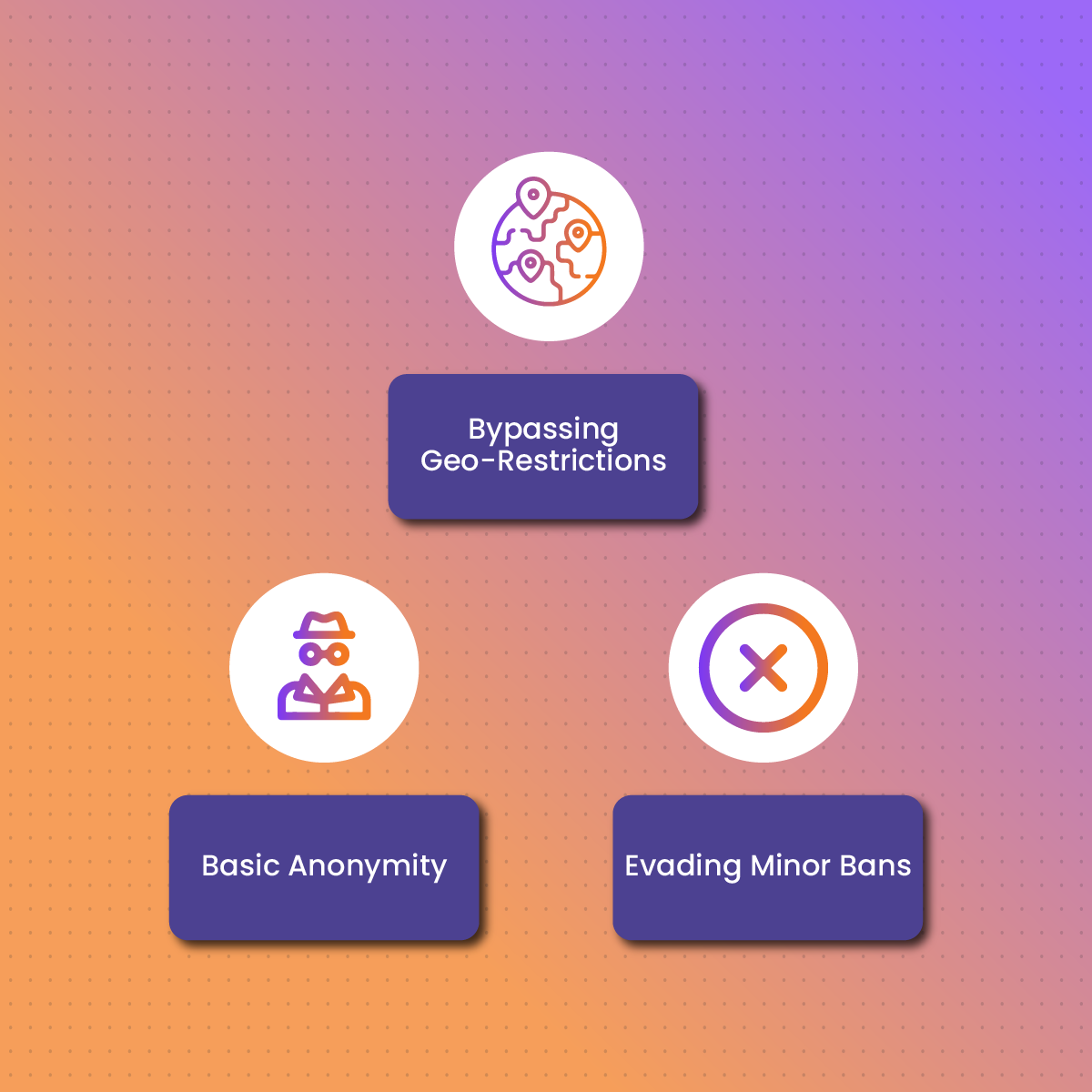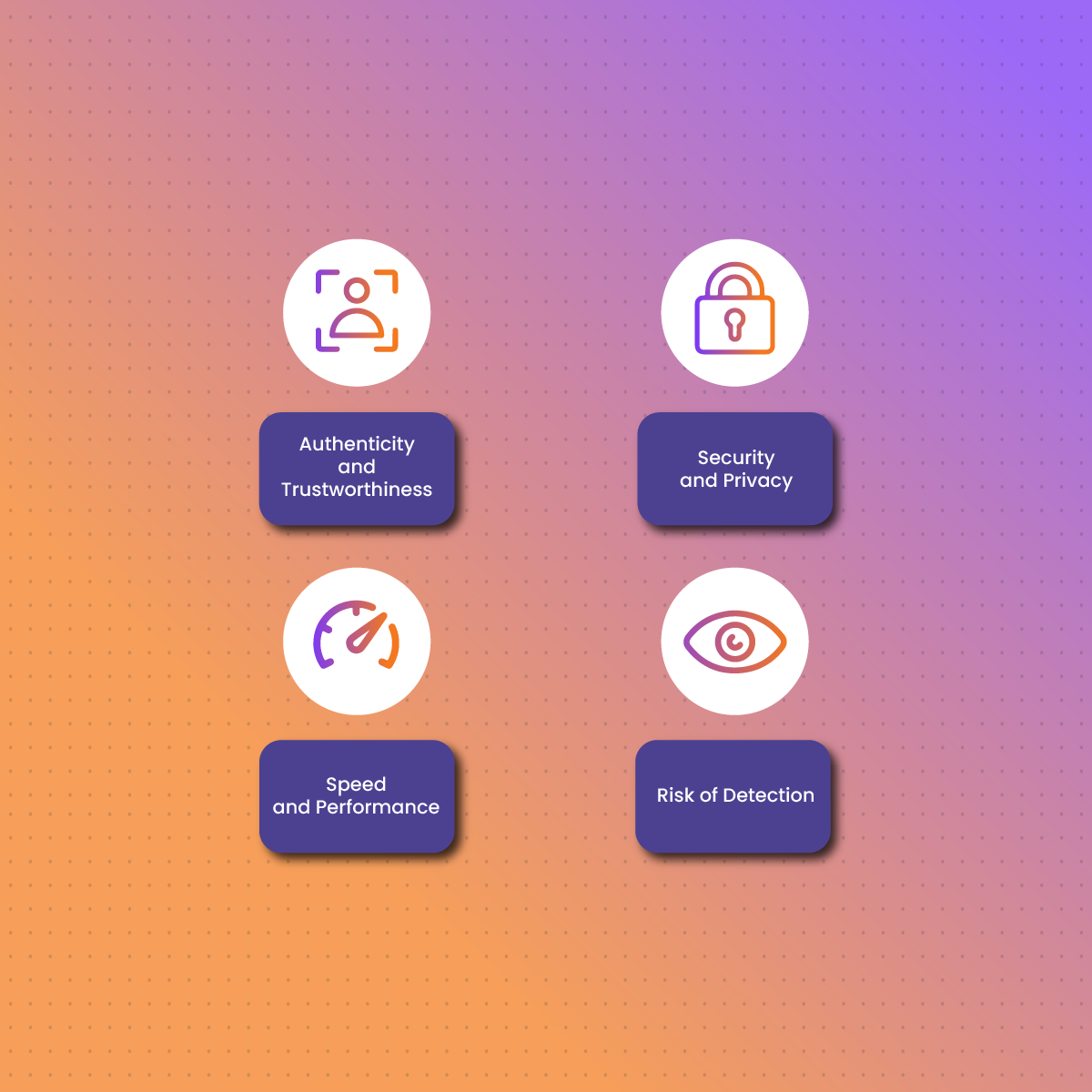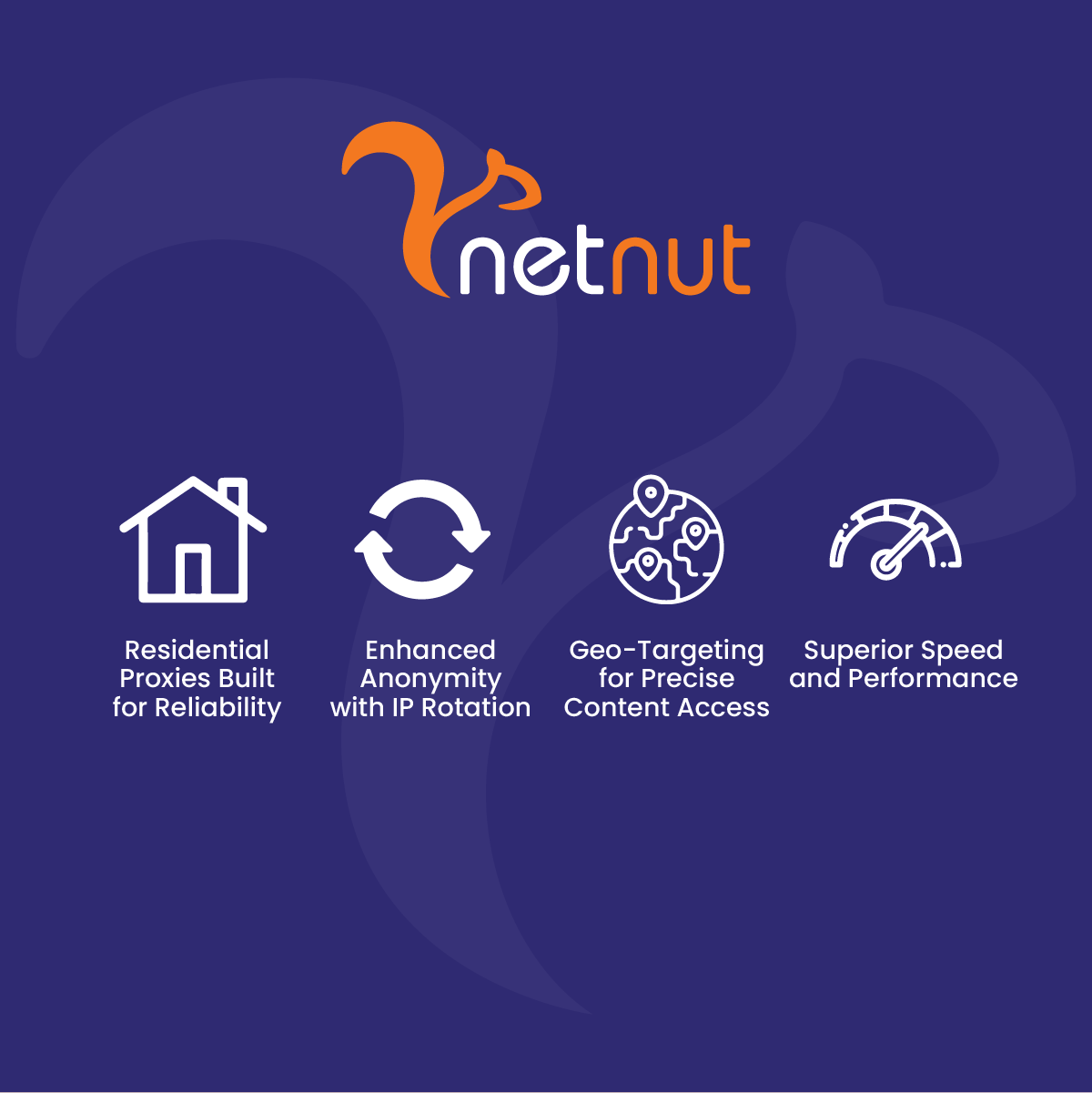In an era where privacy concerns, geo-restrictions, and website security measures are becoming increasingly common, the need to mask or change your IP address is essential for many online activities. Whether you’re bypassing content restrictions, managing multiple accounts, or engaging in large-scale web scraping, the tools you use to hide your IP address can make all the difference.
There are two popular methods for achieving this: using a fake IP address or utilizing residential proxies. While both can mask your identity, they are not created equal. In this article, we will explore the key differences between the two and why residential proxies, such as those provided by NetNut, are the superior choice for most tasks.
What Is a Fake IP Address?
A fake IP address refers to a method of masking your actual IP address with another one, typically through a VPN (Virtual Private Network), a datacenter proxy, or other IP-masking tools. These fake IPs are not tied to physical locations or real devices, which makes them easier to detect by websites that employ sophisticated anti-bot and anti-fraud systems.
How Fake IP Addresses Work
Fake IP addresses are usually provided by datacenter proxies or VPN services. These IPs originate from large server farms and are assigned to users temporarily to reroute their internet traffic. When you connect to a VPN or datacenter proxy, the website you visit sees the IP address of the server, not your actual device.
While this method effectively masks your real IP, websites have become increasingly adept at recognizing and blocking datacenter IPs because they often lack the authenticity of residential or mobile IPs. Many websites flag these IPs as “non-human” traffic, increasing the likelihood of detection.
Common Uses for Fake IP Addresses
Fake IP addresses are most commonly used for:
- Bypassing Geo-Restrictions: Users might use fake IPs to access content that’s restricted based on location, such as streaming services or region-specific websites.
- Basic Anonymity: For users seeking simple anonymity when browsing the internet, a VPN or fake IP might suffice. However, this method is far from foolproof.
- Evading Minor Bans: Fake IPs are sometimes used to circumvent minor bans or restrictions placed on accounts by certain websites.
While these use cases are valid, they’re often limited. The anonymity provided by fake IP addresses can easily be compromised, especially for more complex tasks like web scraping or automated processes, where IP detection systems are highly sensitive.
What Are Residential Proxies?
In contrast to fake IP addresses, residential proxies provide users with IP addresses assigned by Internet Service Providers (ISPs) to real residential devices. These IPs are tied to real physical locations, making them far more trustworthy and harder for websites to detect.
Residential proxies allow users to route their internet traffic through a legitimate home user’s connection, which makes websites perceive the traffic as coming from a genuine user. This helps prevent detection, making residential proxies far more effective for tasks that require high-level anonymity, security, and stability.
How Residential Proxies Work
When you connect via a residential proxy, your internet requests are routed through a device that belongs to a real residential user. This proxy provides an IP address that looks completely legitimate to websites because it comes from a real ISP and location.
Since residential proxies mimic normal user traffic, websites and services treat them with a higher level of trust compared to datacenter proxies or fake IP addresses. For businesses engaging in web scraping, market research, or ad verification, residential proxies offer a safer, more reliable way to gather data or perform automation without getting blocked.
Common Uses for Residential Proxies
Residential proxies are frequently used for:
- Web Scraping: Because residential proxies are harder to detect, they allow users to scrape data from websites without being blocked by anti-bot systems.
- Ad Verification: Companies use residential proxies to verify that online ads are displayed correctly in specific regions, ensuring proper geo-targeting.
- Managing Multiple Accounts: Residential proxies help manage multiple social media or ecommerce accounts without being flagged for suspicious activity.
- Bypassing Geo-Restrictions: Residential proxies allow users to access content or websites restricted by region, similar to fake IP addresses but with a much higher success rate.
NetNut’s residential proxies offer a reliable, secure solution for these types of use cases. With a vast network of IPs from real residential users, NetNut’s proxies provide the anonymity and legitimacy needed to perform complex tasks without the risk of being blocked or detected.
Key Differences Between Residential Proxies and Fake IP Addresses
To understand why residential proxies are often better than fake IP addresses, it’s crucial to look at the specific differences between the two methods. These differences will highlight why residential proxies offer greater reliability, security, and overall performance.
Authenticity and Trustworthiness
Residential Proxies:
Residential proxies are assigned by ISPs to real households, which makes them incredibly difficult to distinguish from legitimate users. Because they originate from real devices in real locations, they are highly trusted by websites, making it less likely that your activity will be flagged as suspicious or bot-like.
When using a residential proxy, your requests appear to come from authentic sources, providing the highest level of trustworthiness. This makes residential proxies ideal for activities such as web scraping, managing multiple accounts, and ad verification, where bypassing strict security measures is essential.
Fake IP Addresses:
Fake IP addresses, particularly those generated by datacenter proxies or basic VPN services, lack authenticity. Websites can easily detect that these IPs are coming from server farms, not real users. Many platforms maintain databases of known datacenter IPs, and if your IP is flagged as suspicious, you could be blocked outright.
Websites that employ sophisticated anti-bot systems or geo-targeting measures often blacklist fake IPs due to their high likelihood of being associated with automated behavior or malicious intent.
Security and Privacy
Residential Proxies:
Residential proxies provide a higher level of security and privacy because they blend seamlessly with normal web traffic. Since your internet activity appears to come from real home users, it’s much harder for websites to track or block you.
NetNut’s residential proxies also offer rotating IP features, allowing you to cycle through multiple IPs to further increase anonymity. This reduces the risk of detection when performing tasks that require high volumes of requests, like web scraping or account management.
Fake IP Addresses:
Fake IP addresses are often less secure. Because they are easily identified, your privacy is compromised when a website flags your connection. Additionally, many datacenter proxies share IP addresses among multiple users, which can lead to security risks like cross-account bans or inadvertent exposure to malicious users on the same network.
Speed and Performance
Residential Proxies:
Residential proxies tend to offer stable performance, although speeds can vary depending on the quality of the proxy provider. The performance you get from residential proxies is usually reliable enough for tasks that require stable connections over extended periods, such as automation or streaming content.
NetNut’s residential proxy network is optimized for speed and uptime, ensuring that you can access websites and applications without interruptions or significant slowdowns, even during high-traffic periods.
Fake IP Addresses:
Fake IP addresses, especially those from low-quality VPNs or datacenter proxies, may offer higher speeds in some cases, but this comes at the cost of reliability. These connections are often blocked or throttled by websites due to their low trust level. Performance can also be inconsistent if the same IP is being used by multiple people at the same time, leading to congestion and slow speeds.
Risk of Detection
Residential Proxies:
Since residential proxies use IPs that come from actual households, they have a low risk of detection. They mimic normal user behavior, which makes them extremely difficult for websites to flag. This makes residential proxies ideal for complex activities like scraping, which involves sending multiple requests to a site without being detected.
With rotating residential proxies, the risk of detection is even further minimized. IPs rotate automatically, so you avoid raising any red flags during large-scale operations, ensuring smooth and uninterrupted access.
Fake IP Addresses:
Fake IP addresses are at a much higher risk of being detected. Websites and platforms are now equipped with advanced tools to detect datacenter IPs and VPNs. Once flagged, your activity will likely be blocked or restricted, which can bring any automation or web scraping task to a halt.
Advantages of Residential Proxies Over Fake IP Addresses
When comparing residential proxies to fake IP addresses, it’s clear that residential proxies offer numerous advantages in terms of security, anonymity, and performance. Here’s why residential proxies consistently outperform fake IPs:
Better for Web Scraping and Automation
Web scraping requires sending a large number of requests to a website, often within a short period. Residential proxies are better suited for this because they are much harder to detect compared to fake IP addresses from datacenters or public VPNs. Websites with anti-bot systems actively block datacenter IPs, making fake IP addresses almost unusable for web scraping.
In contrast, NetNut’s residential proxies allow users to scrape data from websites with minimal risk of being blocked. By rotating IPs, NetNut ensures that your requests appear to come from multiple real users across various locations, making it difficult for websites to flag or block the traffic.
Improved Anonymity and Security
When anonymity is a priority—whether for managing multiple accounts or accessing restricted content—residential proxies provide a much more secure solution than fake IP addresses. Since residential proxies use real IPs from ISPs, websites perceive the traffic as legitimate, making it nearly impossible to trace back to the user.
NetNut enhances this with its rotating residential proxies, offering an extra layer of security. Each time you send a request, it appears to come from a different real user, making it far less likely for your activity to be traced or blocked.
Geo-Specific Targeting
Residential proxies allow for precise geo-targeting. This is especially useful for businesses that need to test geo-restricted content, verify ads, or gather data from specific regions. With NetNut’s geo-targeted proxies, users can select IP addresses from specific countries or regions, allowing them to view content or interact with websites exactly as a local user would.
Fake IP addresses, on the other hand, offer far less flexibility when it comes to geo-targeting. Even when using a VPN, there is no guarantee that the IP addresses provided will bypass geo-restrictions, as many VPNs are already blocked by websites that impose regional restrictions.
When to Use Residential Proxies vs. a Fake IP Address
While both residential proxies and fake IP addresses have their use cases, knowing when to use each can make a significant difference in your online activities. Below are scenarios in which one option might be better than the other.
Use Residential Proxies If:
- You Need to Scrape Data or Automate Tasks: If you’re engaging in web scraping or automation (such as managing multiple accounts or running a bot), using residential proxies is crucial. Websites have advanced detection systems that can easily block fake IP addresses, but residential proxies, like those provided by NetNut, allow you to perform these tasks without interruption. Residential proxies rotate IPs and simulate traffic from real users, reducing the chances of being flagged.
- You Require High Anonymity: When privacy and anonymity are top priorities—whether you’re managing several accounts, performing sensitive research, or browsing securely—residential proxies provide the highest level of protection. They ensure your activity appears as though it’s coming from real users, making it difficult for anyone to trace it back to you.
NetNut’s residential proxies provide a rotating IP network, offering an additional layer of anonymity by switching your IP address periodically. - You Want to Bypass Geo-Restrictions for Business Use: If you need to access region-specific content for business purposes, such as ad verification, content testing, or market research, residential proxies are your best option. They allow you to choose IP addresses from specific geographic locations, making it possible to view content or websites as if you were a local user.
NetNut’s geo-targeted residential proxies enable seamless access to geo-restricted content and services, allowing you to conduct your business without worrying about location-based blocks.
How NetNut’s Residential Proxies Outperform Fake IP Addresses
When it comes to choosing between a fake IP address and a residential proxy, NetNut’s residential proxies clearly stand out. Whether you need to scrape data, manage accounts, or ensure maximum privacy, NetNut’s network of real residential IPs offers unmatched performance. Let’s take a look at how NetNut’s residential proxies outperform fake IP addresses in key areas.
Residential Proxies Built for Reliability
Unlike fake IP addresses, which are often flagged by websites and prone to connection drops, NetNut’s residential proxies offer reliable, uninterrupted access. Residential IPs are less likely to be blocked because they are assigned by ISPs to real users, making your traffic appear completely legitimate.
NetNut’s proxies are specifically designed for reliability, with a large pool of residential IP addresses that rotate automatically to ensure continuous uptime and minimal disruption. Whether you’re performing large-scale web scraping or running automation tasks, you can count on NetNut’s proxies to maintain stable and secure connections.
Enhanced Anonymity with IP Rotation
Fake IP addresses, particularly those from VPNs or datacenter proxies, are much easier to detect because they often come from server farms with identifiable IP ranges. NetNut’s residential proxies, on the other hand, offer rotating residential IPs, which are assigned dynamically, making them harder for websites to detect and block.
By continuously switching between multiple real IP addresses, NetNut ensures that your online activity remains anonymous and undetected, providing an extra layer of privacy when scraping data, automating processes, or accessing restricted content.
Geo-Targeting for Precise Content Access
For businesses that need access to geo-restricted content or want to test ads in specific locations, NetNut’s geo-targeted proxies are invaluable. These proxies allow you to choose IP addresses from specific countries or regions, ensuring that you can view and interact with websites as though you were a local user.
Fake IP addresses, on the other hand, often come from a limited pool of datacenter IPs that may not be tied to specific locations, making it harder to bypass advanced geo-restrictions. NetNut’s residential proxies provide precise geo-targeting, enabling you to access region-specific content reliably.
Superior Speed and Performance
Performance is a critical factor, especially when working on tasks like web scraping, automation, or streaming. Fake IP addresses often suffer from slower speeds and inconsistent connections, particularly when multiple users share the same IP address.
NetNut’s residential proxies are optimized for speed and high performance. By leveraging a vast network of real residential IPs, NetNut ensures that your connection remains fast and reliable, even when handling heavy traffic. This makes it an ideal solution for tasks that require constant, high-speed access to the web.
High Success Rate in Bypassing Anti-Bot Systems
Many websites use sophisticated anti-bot systems to detect and block fake IP addresses, especially datacenter proxies. These systems can easily flag non-residential IPs, making it difficult to bypass security measures.
NetNut’s residential proxies are far more effective at bypassing these systems. Because the IP addresses come from legitimate residential users, they appear completely normal to anti-bot systems, allowing you to access websites without triggering blocks or restrictions.









